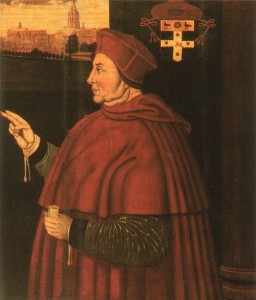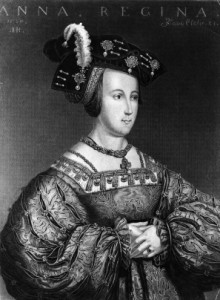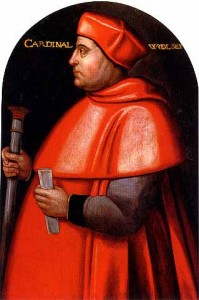
Over the past few weeks, I have been considering Anne Boleyn’s relationships with those around her and today I want to look at her relationship with Cardinal Thomas Wolsey, Henry VIII’s Lord Chancellor and right-hand man.
Anne Boleyn and the Boleyn faction are often credited with causing Wolsey’s downfall and subsequent death, and many are keen to blame Wolsey’s fall from grace on Anne’s desire for revenge for upsetting her plans to marry Henry Percy.
But was Anne out for revenge and did she hate Wolsey?
Let’s consider this!
Revenge is Sweet
In Jean Plaidy’s wonderful novel “Murder Most Royal” (my favourite fictional account of Anne’s story), Cardinal Wolsey reproaches Henry Percy for planning to marry Anne Boleyn and makes it clear that the King is displeased and that the marriage cannot go ahead. Percy leaves a message for Anne and leaves court, knowing that he cannot go against the King. Plaidy then writes:
“And the Cardinal, passing through the palace courtyard with his retinue, saw a dark-eyed girl with a pale, tragic face at one of the windows…The black eyes blazed into sudden hatred as they rested on him, for there had been those who had overheard Wolsey’s slighting remarks about herself and hastened to inform her. Wolsey she blamed, and Wolsey only, for the ruin of her life.”
Later in the novel, Anne does indeed get her revenge as Wolsey fails to get the King his divorce and Anne finds out that Wolsey wrote to the Pope seeking to delay the divorce. Anne takes the evidence “in triumph to the King” and Plaidy writes:
“But she would not let her enemy live”
Henry reluctantly accepts the evidence and to satisfy both Anne and his ministers he orders Wolsey’s arrest, but it is Anne who makes him send Henry Percy to do it – what revenge!
But all this is out of an historical novel written 50 years ago – did it really happen like that? Did Anne really hold a grudge against Wolsey and take revenge on him in this way?
The Facts
It is actually quite hard to get at the facts and the feelings of people concerned and Eric Ives points out that the main source for the story of Henry Percy, his involvement with Anne and “telling off” from Wolsey is George Cavendish’s biography of the Cardinal. In this biography, he tells the love story of the maid of honour (Anne) and Henry Percy, a member of Wolsey’s household, and how Henry VIII ordered Wolsey to step in and prevent the marriage because he was attracted to Anne.
Cavendish writes of how Wolsey called Percy to him and told him that he had offended his father, the Earl of Northumberland, and the King with his plans to marry Anne, that the King had another match planned for Anne and that he needed to end the relationship. Percy was then unhappily married off to Mary Talbot, daughter of the Earl of Shrewsbury, and Anne harboured a hatred for Wolsey and threatened that “if it lay ever in her power, she would work the cardinal as much displeasure”.
Eric Ives makes the very valid point that Cavendish’s account of Anne’s reaction cannot be relied on and is highly improbable. Anne was simply a maid at this time and who was she to go making such threats against a cardinal. Ives says:
“”To go about making threats against the cardinal in 1522 or 1523 was both unwise and childish, and Anne was neither. When we have some first-hand evidence of her relationship with Wolsey some six or seven years later, it is far more subtle than is explicable by a long-held grudge.”
Another episode that is often put forward as proof of Anne’s hatred for Wolsey and her need for revenge is Wolsey’s interference in Anne’s plans to help a Carey relative become abbess of the nunnery of St Edith at Wilton. Unfortunately, Anne’s candidate had a rather sordid past, and so was unsuitable, but Wolsey’s support for another candidate led to him crossing Anne and her allegedly giving him a bloody nose, although this may have been unintentional according to David Loades (“The Six Wives of Henry VIII”). But, what we have to remember, as Loades points out, is that:
“Anne had no incentive to undermine Wolsey’s position with the King as long as he seemed to be the most likely person to secure the annulment of Henry’s marriage.”

Whatever Anne’s own personal feelings about Wolsey, he was the one man that could get her what she wanted, and her hopes for marriage to the King were riding on him.
Anne sent the Cardinal a letter in which she made promises of the things that she could do for him if he could get her and Henry what they wanted or, as Anne put it, “a good end”, and she sent him many other letters encouraging him to do what he could. It seems that Anne only moved against Wolsey when she realised that he was actually trying to hinder the plans for the annulment rather than move them forward and it seems that she and Henry gleaned that Wolsey was not being entirely honest with them in regards to the Pope’s feelings on the planned annulment from reports sent by Sir Francis Bryan who was in Rome.
To cut a rather long story short, Bryan’s reports and other incidents, like Wolsey quarrelling with the French ambassador and upsetting Francis I when Henry really needed his support, made Henry lose his trust in Wolsey. The Cardinal was charged with praemunire in October 1529 and lost his office, as well as his property. He was, however, pardoned and sought to regain the King’s favour.
Wolsey’s Big Mistake
Unfortunately, it was then, in 1530, that Wolsey made his biggest mistake. Instead of looking to gain favour with Anne Boleyn, who had a major influence over Henry, Ives writes of how Wolsey sought to “work for a rapprochement with Katherine, Charles V and Rome” and that plans were in place for a papal edict to be sent to Henry ordering him to leave Anne and go back to his wife. Wolsey had obviously underestimated Henry’s love for Anne, his determination to remarry and Anne’s influence over the King – Duh! (Sorry, had to say that!)
Anne of course found out about this and convinced Henry to move against Wolsey. However, she could not have been successful in this without some evidence against Wolsey and Ives believes that there may have been evidence of Wolsey’s dealings with Rome, Francis I of France or the Holy Roman Emperor. Anne’s anger alone would not have been enough to turn Henry against his friend and adviser.
Fiction
David Loades writes of how the idea that Anne and a Boleyn faction were masterminding a plot to bring down Wolsey has its origins in “the fertile mind” of the imperial ambassador, Inigo de Mendoza, and that there is no clear evidence of a Boleyn faction even existing before Wolsey’s fall. He also writes of how the King’s frustration and anger, when he found out that Wolsey was unable to give him his annulment, needed no further stimulation or stirring from Anne and Loades even goes as far as saying:
“If he [Wolsey] had survived the crisis of 1529/30, there is no reason to suppose that they [Anne, Henry and Wolsey] would not have worked together in amity.”
My feeling, from the work of Loades, Ives and the many history books and biographies I have read on Anne Boleyn and Henry VIII, is that Cardinal Thomas Wolsey was the author of his own demise. No one was to blame for his fall from grace except him.

Wolsey had been given a mission: to sort out the King’s “Great Matter”, to get the King the desired annulment so that he could remarry and give England a male heir to the throne. Wolsey failed. It may have been a “mission impossible”, but Wolsey failed his master and his master punished him. To blame Anne Boleyn entirely for Wolsey’s fall is to give credence to historical fiction and to credit her with more power than she had.
Wolsey’s fall, and his death on the way to being interrogated, left the way wide open for the Boleyn supporters and Dr Thomas Cranmer, who ultimately showed Henry how he could use God’s own law to bypass Rome and get what he wanted.
Henry no longer needed permission from Rome, he could annul the marriage himself and marry his true love, Anne Boleyn. This was triumph for Anne and her followers, and also for the King, and, although there was still quite a long journey ahead, the couple had renewed hope.
Wolsey’s fall and death was indeed a blessing for Anne Boleyn and her supporters but it was not entirely of their doing.
Comments
As always, I welcome your comments, theories and opinions on this post – I learn as much from your comments as I do from reading history books!
Further Reading
By far the best biography of Anne Boleyn, in my opinion, is Eric Ives’ “The Life and Death of Anne Boleyn” – wonderful! As someone said on Twitter “I would read Ives’ shopping list!”
Other books I would recommend to get an insight into Anne Boleyn are:-
“The Rise and Fall of Anne Boleyn” by Retha Warnicke
“The Six Wives of Henry VIII” by David Loades
“The Lady in the Tower: The Fall of Anne Boleyn” by Alison Weir – I’m reading it now!
Click here to read my review of Jean Plaidy’s “Murder Most Royal” – September’s Book of the Month.